The Making of a Great API
A presentation at PHPSW in in Bristol, UK by Rob Allen

T H E M A K I N G O F A G R E AT A P I ROB ALLEN N I N E T E E N F E E T LT D S L I D E S : H T T P S : / / A K R A B AT. C O M / 6 1 6 8 @akrabat

FIT FOR PURPOSE

F E AT U R E S O F A G O O D A P I • Malleability • Correctness • Error handling • Documentation • Security @akrabat

A GOOD API IS MALLEABLE

D E C O U P L E Y O U R R E P R E S E N TAT I O N @akrabat

HYPERMEDIA • An explorable API • Rename end points at will • Re-home end points on different servers @akrabat
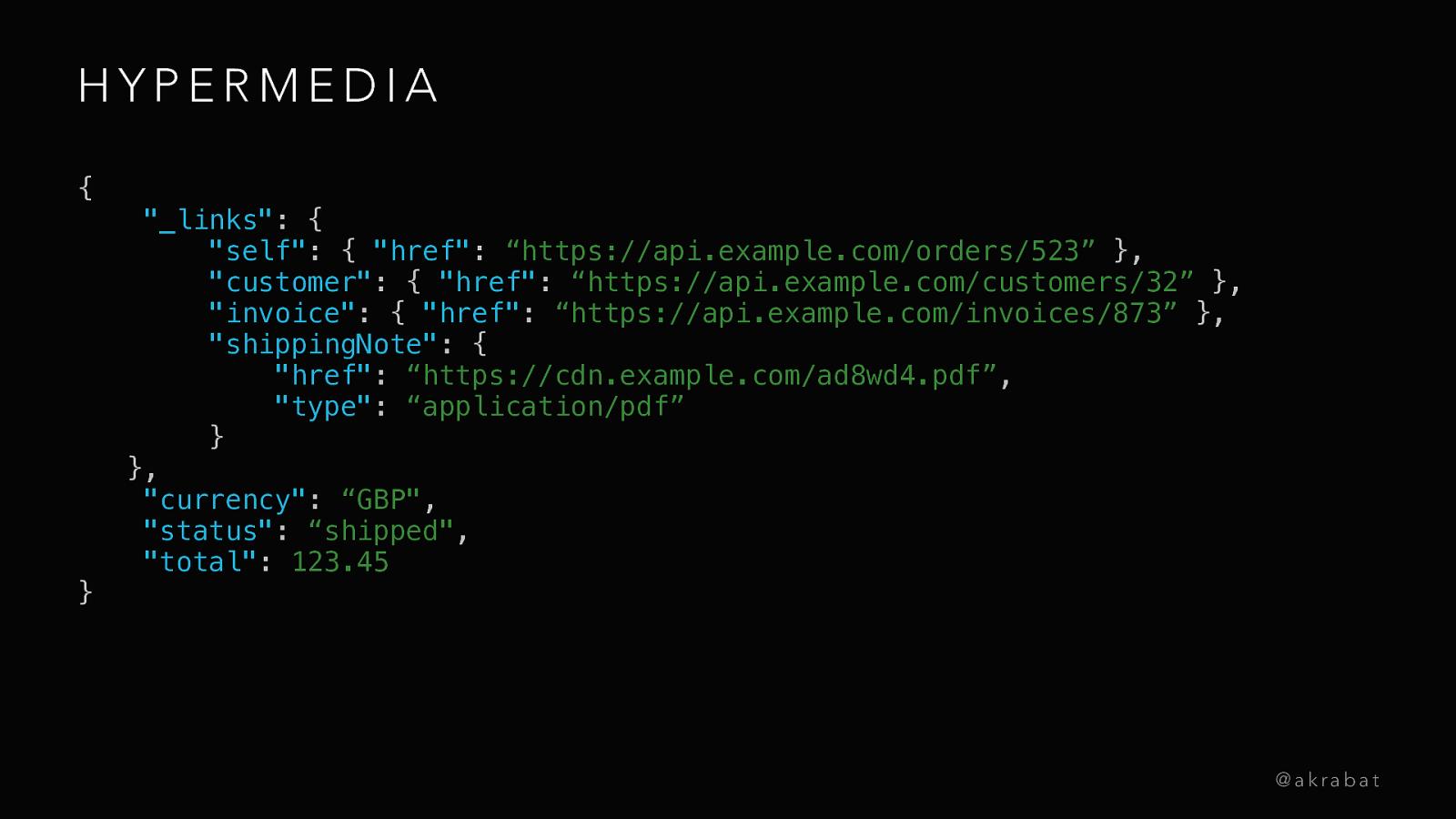
HYPERMEDIA { } “_links”: { “self”: { “href”: “https://api.example.com/orders/523” }, “customer”: { “href”: “https://api.example.com/customers/32” }, “invoice”: { “href”: “https://api.example.com/invoices/873” }, “shippingNote”: { “href”: “https://cdn.example.com/ad8wd4.pdf”, “type”: “application/pdf” } }, “currency”: “GBP”, “status”: “shipped”, “total”: 123.45 @akrabat

A GOOD API IS CORRECT
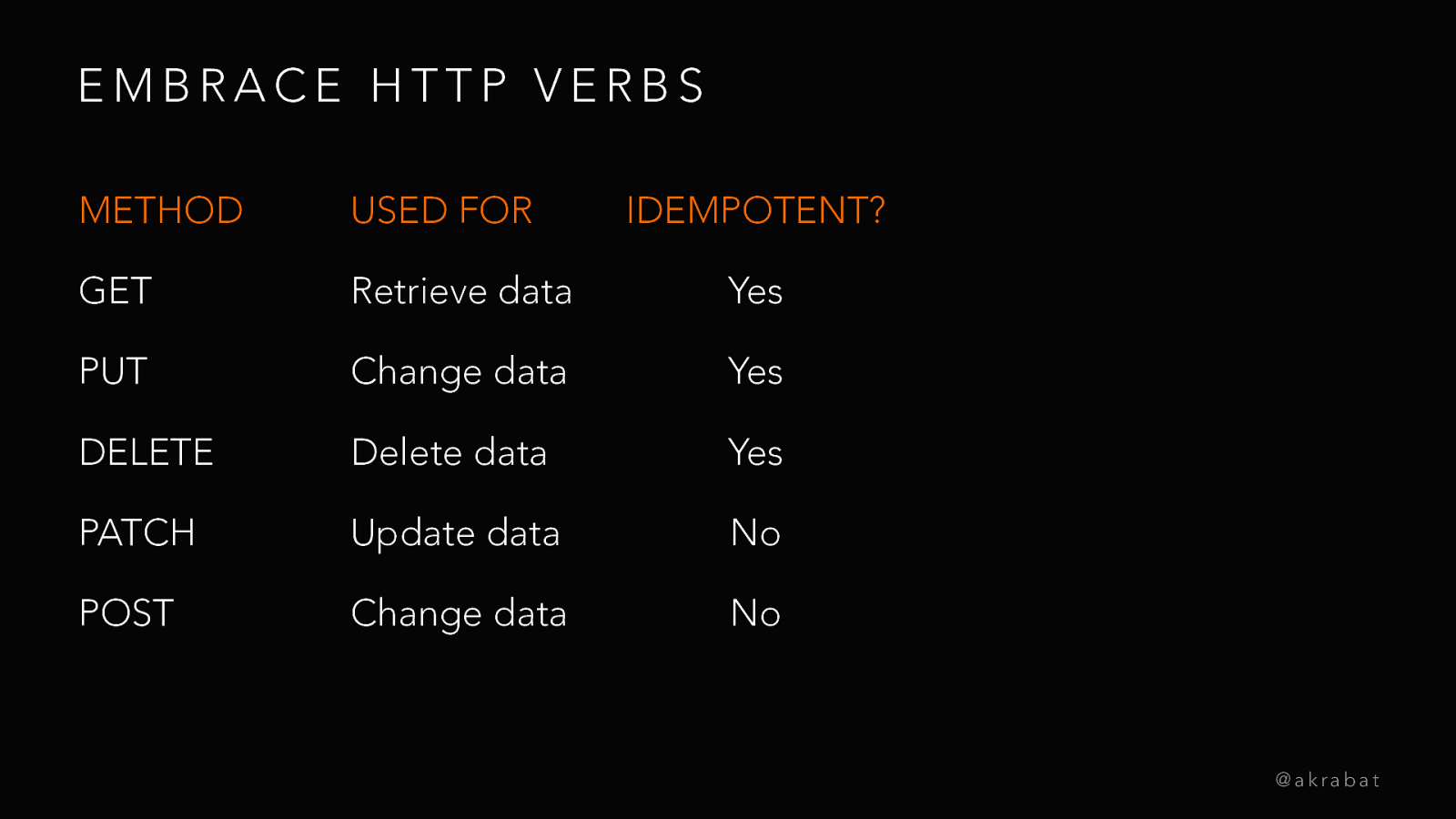
EMBRACE HTTP VERBS METHOD USED FOR IDEMPOTENT? GET Retrieve data Yes PUT Change data Yes DELETE Delete data Yes PATCH Update data No POST Change data No @akrabat

S TAT U S C O D E S M AT T E R 1xx Informational 2xx Success 3xx Redirection 4xx Client error 5xx Server error @akrabat

MEDIA TYPES • Read Content-Type header to decode incoming data • Honour the Accept header when sending data @akrabat

HANDLING CHANGES • Avoid major new versions • Make changes backwards-compatible • Think about forwards-compatibility @akrabat

A NEW VERSION IS A NEW API • Separate code • Domain or URL path is fine • api.example.com/v2/user • api2.example.com/user • Use Server header for minor and patch info @akrabat

A GOOD API HAS G R E AT E R R O R S

G R E AT E R R O R H A N D L I N G • Error representations are first class citizens • Code for computers; messages for humans • Pretty print for the humans! @akrabat
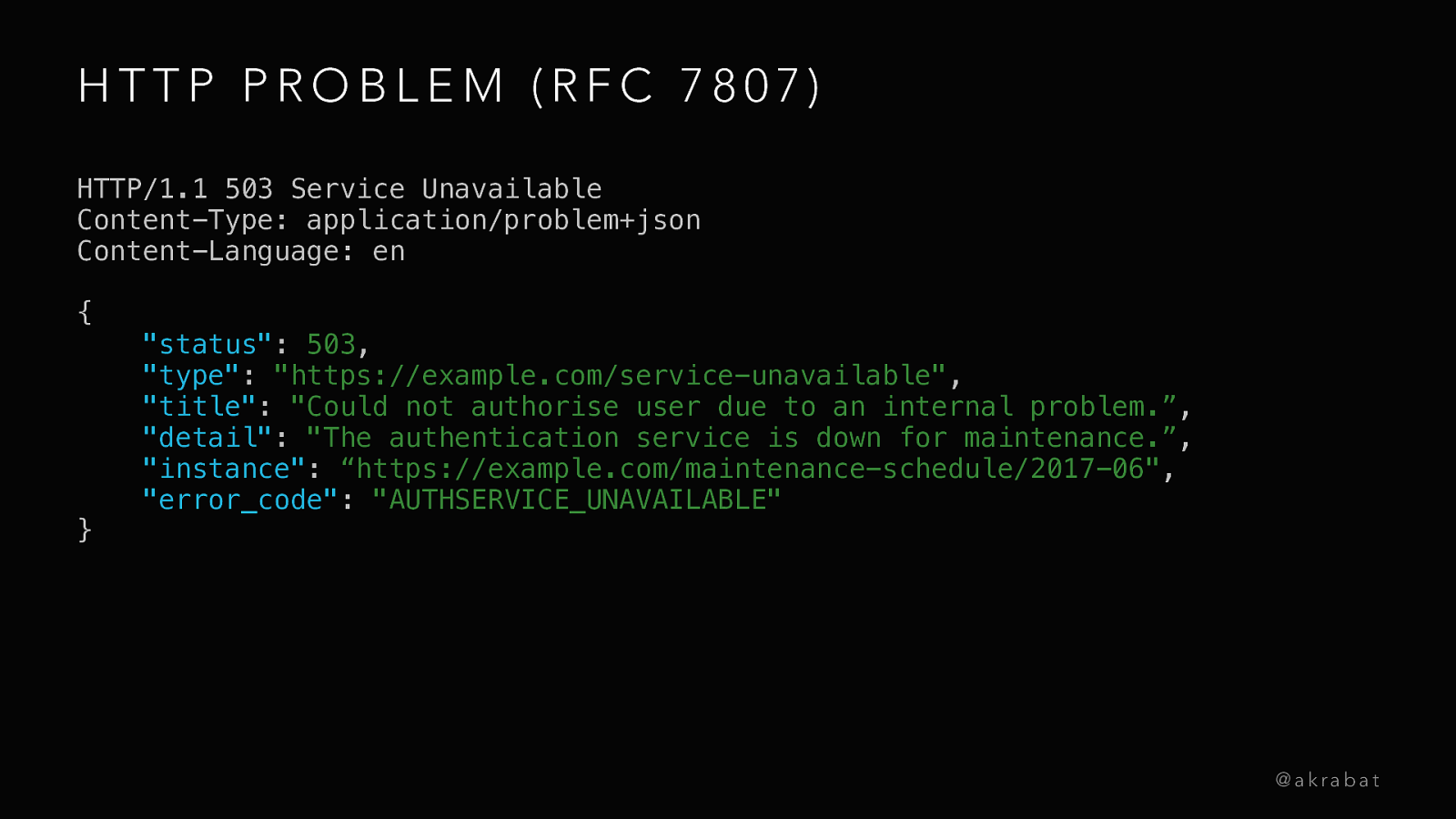
HTTP PROBLEM (RFC 7807) HTTP/1.1 503 Service Unavailable Content-Type: application/problem+json Content-Language: en { } “status”: 503, “type”: “https://example.com/service-unavailable”, “title”: “Could not authorise user due to an internal problem.”, “detail”: “The authentication service is down for maintenance.”, “instance”: “https://example.com/maintenance-schedule/2017-06”, “error_code”: “AUTHSERVICE_UNAVAILABLE” @akrabat

A GOOD API IS DOCUMENTED
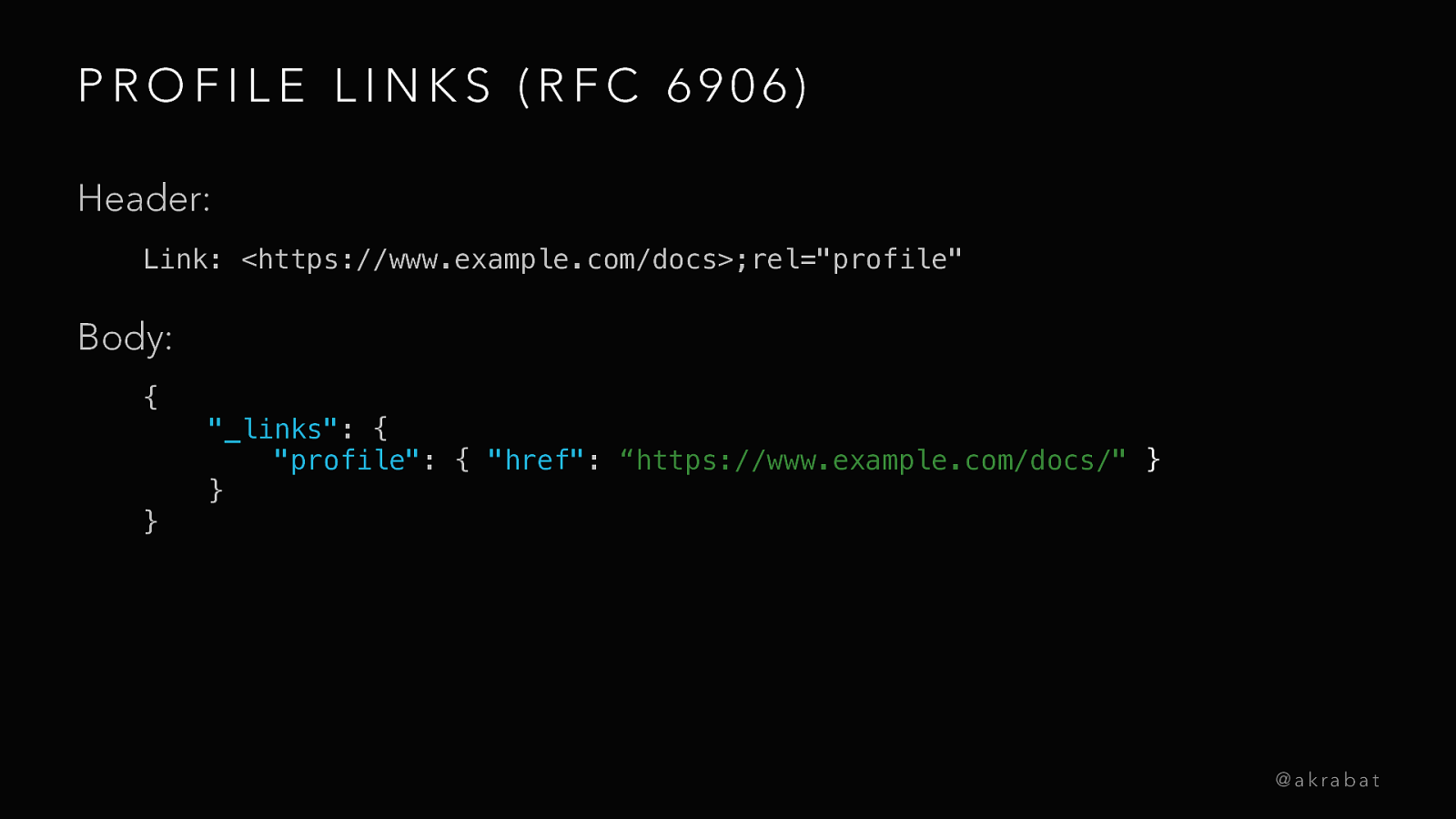
PROFILE LINKS (RFC 6906) Header: Link: https://www.example.com/docs;rel=”profile” Body: { } “_links”: { “profile”: { “href”: “https://www.example.com/docs/” } } @akrabat

H U M A N D O C U M E N TAT I O N • Tutorials • Reference @akrabat

O P E N A P I S P E C I F I C AT I O N • Spec-First API Design • Tooling: https://openapi.tools @akrabat

A GOOD API IS SECURE

OAUTH 2 • Application identification • User identification • User’s trust relationship is with the API @akrabat
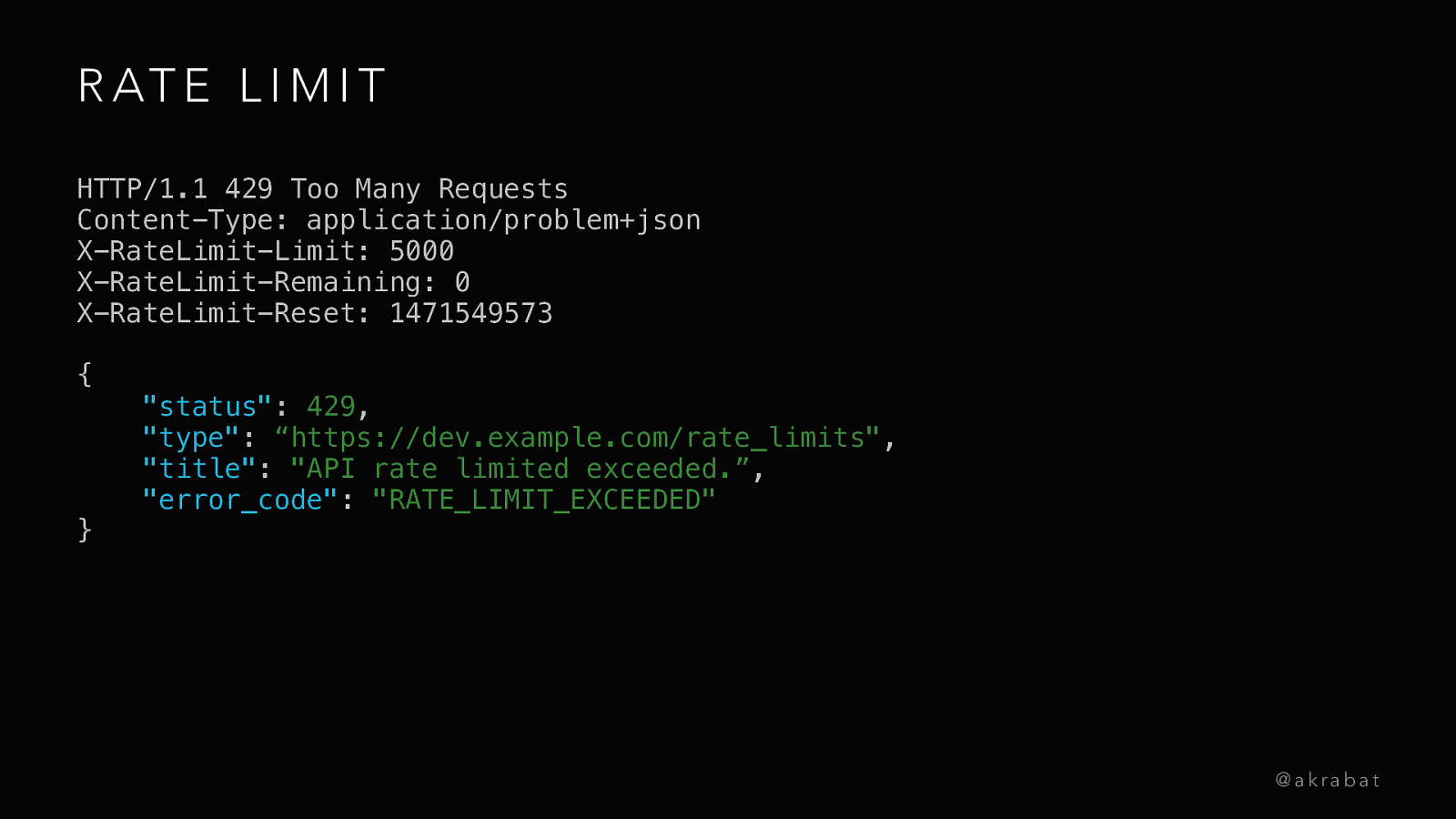
R AT E L I M I T HTTP/1.1 429 Too Many Requests Content-Type: application/problem+json X-RateLimit-Limit: 5000 X-RateLimit-Remaining: 0 X-RateLimit-Reset: 1471549573 { } “status”: 429, “type”: “https://dev.example.com/rate_limits”, “title”: “API rate limited exceeded.”, “error_code”: “RATE_LIMIT_EXCEEDED” @akrabat

TO SUM UP

THANK YOU H T T P S : / / J O I N D . I N / TA L K / 2 C 3 5 E ROB ALLEN @akrabat
Everyone is writing APIs but what makes a great one? I will take you on a tour of the most important features that you should think about when creating an API. These ensure that your API plays well with HTTP and make your API a delight to maintain and work with. Give your API a competitive edge by making it great and developers will want to work with it.
Buzz and feedback
Here’s what was said about this presentation on social media.
-
Next up, @akrabat talking to us about the making of a great API pic.twitter.com/sJzdFD9deW
— PHP South West UK (@phpsw) March 11, 2020 -
"Nobody can version an API" - @akrabat at @phpsw
— Jason B. Standing (@jasonbstanding) March 11, 2020 -
TIL @phpsw there is an RFC for errors in APIs. Thanks @akrabat. pic.twitter.com/ACrJHdqWBe
— Dave Liddament (@DaveLiddament) March 11, 2020 -
Another amazing talk by @akrabat at #PHPSW. I hope everyone listens to him and writes some documentation for their APIs 😭 pic.twitter.com/AFN9ox3FpR
— Liam Hammett (@LiamHammett) March 11, 2020 -
Great talks by @derickr and @akrabat at #PHPSW, lovely to see that the spread operator is coming from ES6 to PHP 7.4👌🏾 pic.twitter.com/ymM9SgJI1s
— Pablo Espinosa (@PabloCamelCase) March 11, 2020
